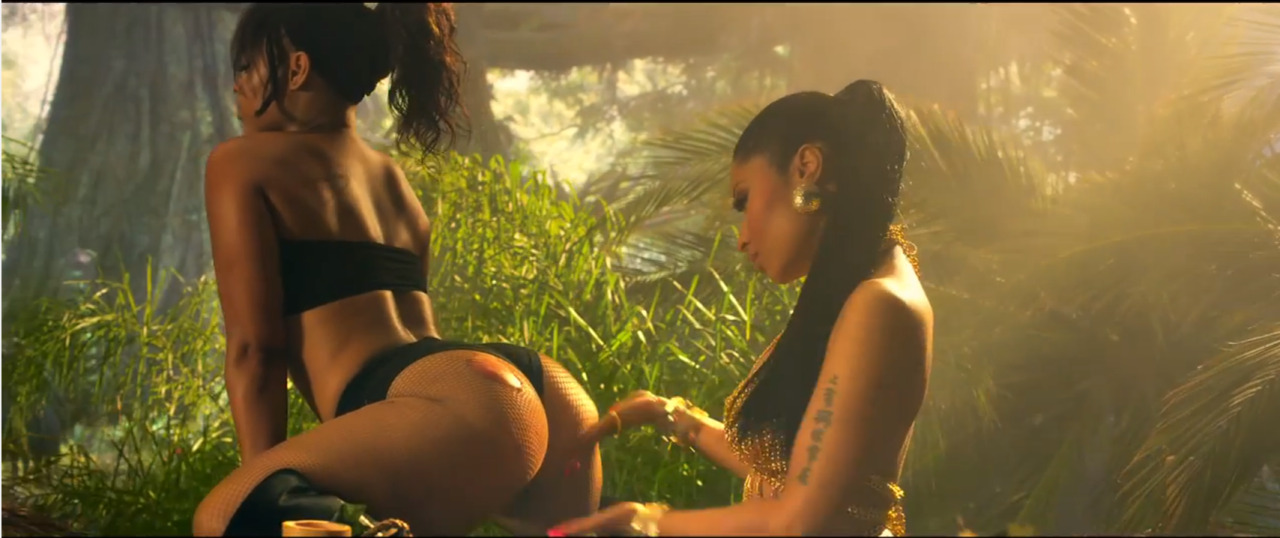So when Miley Cyrus or Katy Perry bring black girls on stage, dance with them, acknowledge their figures- it’s offensive and appropriating. But, when Nicki Minaj makes an entire video focusing around black girl’s asses and asserts her power, reduces these women to objects and flaunts her authority it’s YAAASSSSS NICKI SERVE IT. Is that because she’s black? So it’s okay for people of the same race to dance with each other but someone who does not share the same levels of melanin enters the picture, they’re doing something wrong? …idgi
You’re completely ignoring context. In Lily Allen’s Hard out Here video, she literally says, “I don’t shake my ass cause I have a brain” as Black women shake their asses in her video. She is literally degrading the Black women who shake their asses in the media. The song also uses references to Black rappers (i.e. the title of the song referencing the rap song “Hard out Here for a Pimp” and her lyric “bragging ‘bout my cars or talking ‘bout my chains”), suggesting that Black rappers are more sexist than white male musicians (which isn’t true, there’s lots of sexism in all music genres) and also suggest the source of sexism in the music industry is Black people (Black male rappers and twerking Black female dancers).
In contrast, Nicki Minaj is reclaiming a song (Baby Got Back) that was made by a Black male rapper who celebrated (but also objectified) Black female bodies. Throughout her song, Nicki raps like a man would, talking about her sexual conquests with men and the size of their dicks, almost as a way of doing to men what they have done to women (objectifying their dicks as Sir Mix A Lot objectified Black women’s asses and many other men objectify women’s vaginas). She also brags about her sexual prowess and stays in control and aggressive in the video (she goes as far as cutting a banana representing a dick and slapping Drake’s hand away—the video critiques the male gaze). The target of mockery and disparagement in Nicki’s video is men and the male gaze, and the video works to reclaim agency from it.
In what way is Nicki asserting power over her dancers? In her video, she twerks along side her back up dancers and dances with them and interacts with them on the same level. She is just as scantily clad as they are. Lily Allen, however, stays fully covered in her video, does not dance provocatively, and thus contrasts her own pure and respectable femininity with the Black women, using their twerking and scantily clad bodies as an example of “bad” female sexuality and femininity—of women “objectifying themselves.” This is racist because it frames Black female sexuality as lesser than white femininity and antithetical to feminism.
In summary: Nicki’s video is very much a celebration of female Black beauty and sexuality coming from a Black woman. Conversely, Lilly Allen’s is using Black women as props to frame them as a vile or bad form of sexuality or being too sexual to prop up her own feminism.
So you might say, “what about Miley Cyrus? she twerks along side her Black background dancers too!” But here’s the problem: Miley Cyrus continually appropriates Black culture and also uses Black women as props. It does matter that these artists are white because in these cases the point of including the Black women is either to, in Lily Allen’s case, offset Black sexuality/femininity as too sexual or bad in comparison with her white femininity/feminism, or, in the case of Miley Cyrus, to get “street cred” and exotify her own sexuality by appropriating Black culture and using Black people as props to do so. See this analysis of Lily Allen’s Hard Out Here video and this analysis of Miley Cyrus by Black people who know a lot more about this than I do.
I haven’t seen anything about Katy Perry using Black dancers. I’ve just seen criticisms of her appropriating AAVE and other PoC cultures. I’m not sure why you brought her up, but maybe I just haven’t seen the videos in question.
Either way, it’s not like white artists having a diverse cast of back up dancers is a bad thing automatically. Here is an example of a white artist using back up dancers of other races without objectifying them: https://www.youtube.com/watch?v=8Ilh1ewceco (notice this artist tackles the same issue as Lily Allen—sexism/objectification in the media—without being misogynist and racist toward other women). But the examples of Lily Allen and Miley Cyrus ARE racist and Nicki Minaj’s video isn’t the same as theirs.
I'm probably sleepy. Instagram @jonesiiifromthemoon























